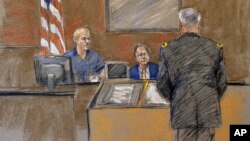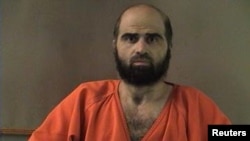Family members of U.S. soldiers killed in a shooting rampage at Fort Hood, Texas in 2009 are testifying at the sentencing phase of the shooter's trial.
Dozens of witnesses took the stand Monday to explain how their lives have been shattered by the massacre carried out by U.S. Army psychiatrist Major Nidal Hasan.
A jury of military officers already has found Hasan guilty of killing 13 people and wounding more than 30 others in the attack on the military base. They must now decide his punishment -- either life in prison or a rare military death sentence.
Survivors of the attack also testified on Monday, including Staff Sergeant Patrick Ziegler. He told jurors how he was shot four times and underwent emergency surgery that removed about 20 percent of his brain.
Hasan, who is an American-born Muslim, has admitted to carrying out the attack, saying he switched sides on what he considers a U.S. war on Islam. He represented himself at his trial and presented no witnesses on his behalf.
In a brief opening statement at the trial, Hasan said the evidence at the trial would "clearly show" that he was the shooter.
His legal advisers at one point in the trial said that Hasan was doing so little in the courtroom to contest the charges because they believed he wanted to be convicted of premeditated murder so he could receive a death sentence.
No U.S. military prisoner has been executed since 1961.
Dozens of witnesses took the stand Monday to explain how their lives have been shattered by the massacre carried out by U.S. Army psychiatrist Major Nidal Hasan.
A jury of military officers already has found Hasan guilty of killing 13 people and wounding more than 30 others in the attack on the military base. They must now decide his punishment -- either life in prison or a rare military death sentence.
Survivors of the attack also testified on Monday, including Staff Sergeant Patrick Ziegler. He told jurors how he was shot four times and underwent emergency surgery that removed about 20 percent of his brain.
Hasan, who is an American-born Muslim, has admitted to carrying out the attack, saying he switched sides on what he considers a U.S. war on Islam. He represented himself at his trial and presented no witnesses on his behalf.
In a brief opening statement at the trial, Hasan said the evidence at the trial would "clearly show" that he was the shooter.
His legal advisers at one point in the trial said that Hasan was doing so little in the courtroom to contest the charges because they believed he wanted to be convicted of premeditated murder so he could receive a death sentence.
No U.S. military prisoner has been executed since 1961.









